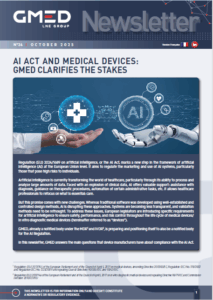 Regulation (EU) 2024/1689 on artificial intelligence, or the AI Act, marks a new step in the framework of artificial intelligence (AI) at the European Union level. It aims to regulate the marketing and use of AI systems, particularly those that pose high risks to individuals.
Regulation (EU) 2024/1689 on artificial intelligence, or the AI Act, marks a new step in the framework of artificial intelligence (AI) at the European Union level. It aims to regulate the marketing and use of AI systems, particularly those that pose high risks to individuals.
Artificial intelligence is currently transforming the world of healthcare, particularly through its ability to process and analyze large amounts of data. Faced with an explosion of clinical data, AI offers valuable support: assistance with diagnosis, guidance on therapeutic procedures, automation of certain administrative tasks, etc. It allows healthcare professionals to refocus on what is essential: care.
But this promise comes with new challenges. Whereas traditional software was developed using well-established and controlled design methods, AI is disrupting these approaches. Systems are becoming less transparent, and validation methods need to be rethought. To address these issues, European legislators are introducing specific requirement for artificial intelligence to ensure safety, performance, and risk control throughout the life cycle of medical devices/ in vitro diagnostic medical devices (hereinafter referred to as “devices”).
GMED, already a notified body under the MDR and IVDR, is preparing and positioning itself to also be a notified body for the AI Regulation.
In this newsletter, GMED answers the main questions that device manufacturers have about compliance with the AI Act.
share
Events
Find an answer to the challenges you are facing in one of our upcoming events: trainings, webinars, forums...
